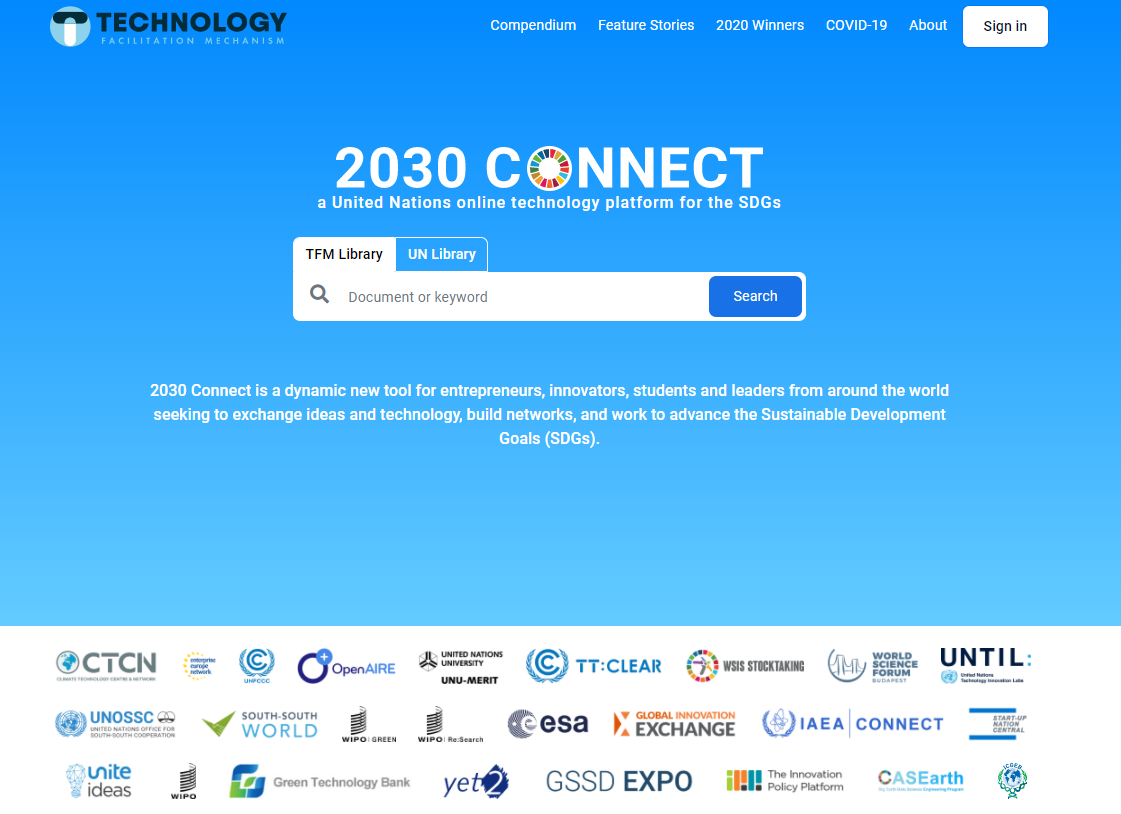More Information
One of the three components of the Technology Facilitation Mechanism is to develop an online platform (2030 Connect) as a gateway for information on existing STI initiatives, mechanisms and programs. Please click here to visit the TFM Online Platform: 2030 Connect.
Work is now underway to design, develop and operationalize the TFM online platform, including preliminary collection of existing technology applications and initiatives in addressing sustainable development challenges.
The TFM online platform will:
- Be used to establish a comprehensive mapping of, and serve as a gateway for, information on existing science, technology and innovation initiatives, mechanisms and programmes, within and beyond the United Nations
- Facilitate access to information, knowledge and experience, as well as best practices and lessons learned, on science, technology and innovation facilitation initiatives and policies
- Facilitate the dissemination of relevant open access scientific publications generated worldwide.
Independent technical assessment for the online platform
As mandated by the 2030 Agenda, the online platform “will be developed on the basis of an independent technical assessment, which will take into account best practices and lessons learned from other initiatives, within and beyond the United Nations, in order to ensure that it will complement, facilitate access to and provide adequate information on existing science, technology and innovation platforms, avoiding duplications and enhancing synergies.”
The Interagency task team on STI for the SDGs (“IATT”) and the 10-Member Group of representatives from civil society, the private sector and the scientific community in support of the Technology Facilitation Mechanism (“10-Member Group”) undertook consultations and developed Terms of Reference for the independent technical assessment.
The Terms of Reference noted the IATT’s initial mapping of existing STI initiatives within the UN system (undertaken by IATT) and the development of three broad options for an online platform - with low, medium and high levels of ambition. It called for an independent technical assessment to serve as the basis for the development of the online platform. The assessment was to include sections on (a) architecture, functional requirements and user group; (b) stocktaking, benchmarking, best practices, and lessons learned from existing relevant online platforms, within and beyond the UN system; (c) recommendations on management and governance structure and regular quality control of the platform; and (d) assessment of the benefits and financial costs.
Following an open call, experts from the Institutes of Science and Development of the Chinese Academy of Sciences, China; the Overseas Development Institute, UK; and of DNV GL, the Netherlands, prepared the mandated independent assessment of the online platform. The final report is a consolidated version of the three reports with a joint summary.
The 10-Member Group examined the assessment report and found it a useful basis for further discussion and action. It should be noted that while Members of the Group agree with a number of important suggestions made in the assessment, there remains a diversity of perspectives on a number of points in the report.
It is therefore important to note that the views expressed in the assessment report do not necessarily represent the views held or endorsed by the 10-Member Group, the UN interagency task team on STI for the SDGs, nor those of the institutions they represent.
Independent assessment report on the TFM online platform (PDF)
We invite detailed comments, feedback, and suggestions for how best to move forward with the online platform as mandated by the 2030 Agenda. In particular, please let us know, if you are interested to partner with and contribute to the actual development of the online platform and if so, what role you see yourself playing.
Mapping of existing information on technology applications
To map existing STI initiatives, mechanisms and programmes, IATT members are collecting examples of technologies to be included in the online platform such as geospatial information technologies, which are critical to sound decision-making in advancing sustainable development. A preliminary list of technology solutions and applications presented below provides a starting point. Stakeholder engagement in this exercise is critically important.
As just one example, geospatial technology applications and initiatives play an essential role in decision–making for economic growth, resource management and ecosystem protection. Geospatial technology applications are necessary to overcome local, national and global challenges, and are key tools for the successful attainment of the SDGs, in particular with regard to land management, forest conservation, sustainable agriculture, integrated water resources management, urban planning, disaster risk reduction and response, and sustainable management of marine and coastal resources.
Demo Version of OLP
The United Nations Department of Economic and Social Affairs, the UN Office of Information and Communication Technology and several other members of the United Nations Inter-Agency Task Team (UN-IATT) have established close collaboration on the development and launch of the OLP. A demo version of this OLP has already been completed on 10 May 2018 and available for the access here.

Technology



